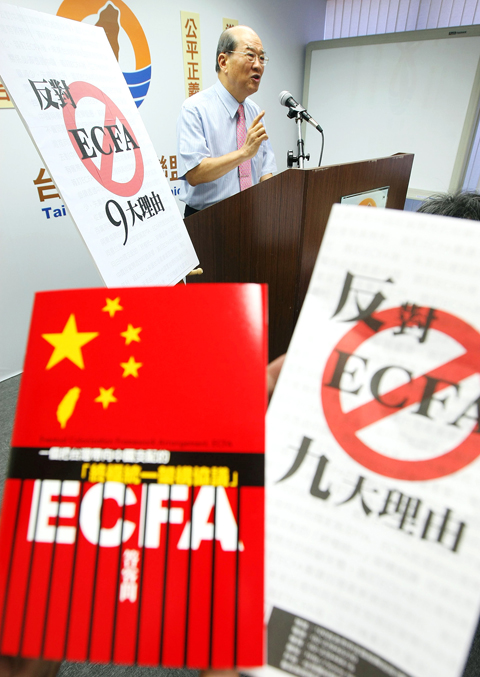The Taiwan Solidarity Union (TSU) released a pamphlet yesterday listing the ways Taiwan would be harmed if it signed an economic cooperation framework agreement (ECFA) with China.
TSU Chairman Huang Kun-huei (黃昆輝) told a press conference that the pamphlet would help the public realize the major disadvantages of an ECFA.
The TSU is cooperating with the Democratic Progressive Party (DPP) to promote a referendum on any pact, Huang said.

PHOTO: CNA
The pamphlet is written by three economists — National Taiwan University economics professor Kenneth Lin (林向愷), National Taiwan University agricultural economics professor Woo Rhung-jieh (吳榮杰) and Wang To-far (王塗發), an adjunct professor of economics at National Taipei University.
Huang said Taiwan’s industrial base had been hollowed out, unemployment had soared and wages had declined since 2001 because of over-investment in China, but President Ma Ying-jeou (馬英九) had ignored this by pushing for closer economic relations with China.
He said that after signing an ECFA with China, Beijing would control Taiwan’s trade with other countries, making Taiwan an economic subsidiary of China.
An ECFA would seriously affect Taiwan’s agriculture sector, Huang said, adding that poor quality Chinese products would inundate the local market and China would absorb Taiwan’s production technology and high quality plant and animal species.
An ECFA would be the death knell for the country’s agriculture sector, he said.
The TSU chairman said that after Hong Kong signed a Closer Economic Partnership Arrangement (CEPA) with China in 2003, its average annual salary declined from US$27,708 to US$24,244 in 2007, mainly because its manufacturing industries were forced to relocate to China.
Huang said Taiwan would not enjoy beneficial treatment along with the ASEAN-plus-China grouping under an ECFA unless Taiwan acknowledged it was a province of China.
China would continue to block Taiwan from signing free trade agreements with other countries, he said.
Making a play on the acronym, Huang described it as an Eventual Colonization Framework Agreement, adding that it was a framework agreement leading Taiwan toward ultimate unification with China.

ACCOUNTABILITY: The incident, which occured at a Shin Kong Mitsukoshi Department Store in Taichung, was allegedly caused by a gas explosion on the 12th floor Shin Kong Group (新光集團) president Richard Wu (吳昕陽) yesterday said the company would take responsibility for an apparent gas explosion that resulted in four deaths and 26 injuries at Shin Kong Mitsukoshi Zhonggang Store in Taichung yesterday. The Taichung Fire Bureau at 11:33am yesterday received a report saying that people were injured after an explosion at the department store on Section 3 of Taiwan Boulevard in Taichung’s Situn District (西屯). It sent 56 ambulances and 136 paramedics to the site, with the people injured sent to Cheng Ching Hospital’s Chung Kang Branch, Wuri Lin Shin Hospital, Taichung Veterans General Hospital or Chung

‘TAIWAN-FRIENDLY’: The last time the Web site fact sheet removed the lines on the US not supporting Taiwanese independence was during the Biden administration in 2022 The US Department of State has removed a statement on its Web site that it does not support Taiwanese independence, among changes that the Taiwanese government praised yesterday as supporting Taiwan. The Taiwan-US relations fact sheet, produced by the department’s Bureau of East Asian and Pacific Affairs, previously stated that the US opposes “any unilateral changes to the status quo from either side; we do not support Taiwan independence; and we expect cross-strait differences to be resolved by peaceful means.” In the updated version published on Thursday, the line stating that the US does not support Taiwanese independence had been removed. The updated

‘CORRECT IDENTIFICATION’: Beginning in May, Taiwanese married to Japanese can register their home country as Taiwan in their spouse’s family record, ‘Nikkei Asia’ said The government yesterday thanked Japan for revising rules that would allow Taiwanese nationals married to Japanese citizens to list their home country as “Taiwan” in the official family record database. At present, Taiwanese have to select “China.” Minister of Foreign Affairs Lin Chia-lung (林佳龍) said the new rule, set to be implemented in May, would now “correctly” identify Taiwanese in Japan and help protect their rights, the Ministry of Foreign Affairs said in a statement. The statement was released after Nikkei Asia reported the new policy earlier yesterday. The name and nationality of a non-Japanese person marrying a Japanese national is added to the

There is no need for one country to control the semiconductor industry, which is complex and needs a division of labor, Taiwan’s top technology official said yesterday after US President Donald Trump criticized the nation’s chip dominance. Trump repeated claims on Thursday that Taiwan had taken the industry and he wanted it back in the US, saying he aimed to restore US chip manufacturing. National Science and Technology Council Minister Wu Cheng-wen (吳誠文) did not name Trump in a Facebook post, but referred to President William Lai’s (賴清德) comments on Friday that Taiwan would be a reliable partner in the